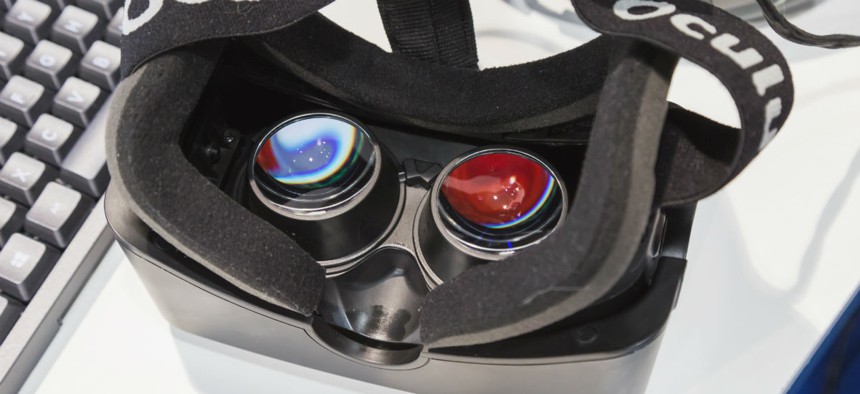Paraplegics Learn to Walk Again with Virtual Reality

Tinxi/Shutterstock
Researchers are using virtual reality to help paraplegic people regain partial sensation and muscle control.
The chances of recovery for paraplegic patients were once considered nearly nil. But in 2014, 29-year-old Juliano Pinto, who faced complete paralysis below the chest, literally kicked off the opening match at the FIFA World Cup. Researchers had created a brain-machine interface that allowed Pinto to control a robotic exoskeleton for the symbolic kickoff at São Paulo’s Corinthians Arena.
Fast forward two years, the Walk Again Project, the same nonprofit international research consortium that designed Pinto’s exoskeleton, is now using virtual reality to help paraplegic people regain partial sensation and muscle control in their lower limbs. According to a study published Aug. 11 in Scientific Reports, all eight patients who participated in the study have already gained some motor control.
“When we look at the brains of these patients when they got to us, we couldn’t detect any signal when we asked them to imagine walking again. There was no modulation of brain activity,” Dr. Miguel Nicolelis, the lead researcher from Duke University in North Carolina, said in a Scientific Reports call Aug. 9. “It’s almost like the brain had erased the concept of moving by walking.”
To regain movement, patients were first placed in virtual reality environment, where they learned to use brain activity to control an avatar version of themselves and make it walk around a soccer field. Researchers used Oculus Rift, which is available for purchase off the shelves.
They also designed a long sleeve T-shirt that would provide haptic feedback to the patients’ forearms, stimulating the sensation of touching the ground. The arms were treated as phantom limbs, substituting for the legs, fooling the brain into feeling like the patient was walking.
After the brain reacquired the notion of walking, each patient graduated to a custom-designed exoskeleton. The exoskeleton uses a cap with nodes on the wearer’s head, which picks up signals and relays them to a computer in the exoskeleton’s backpack. When the patient thinks about walking, the computer activates the exoskeleton.
By walking in the exoskeleton an hour a day, patients were eventually able to rekindle their remaining nerves to send signals back to brain, and reactivate some voluntary movement and sensitivity. Each patient had a different recovery period but all were able to feel sensation again in the pelvic region and lower limbs, and also learned to control some of their muscles, their bladder and bowel function for the first time in many years. DukeToday outlines the improvement:
One participant, “Patient 1,” was a 32-year-old woman paralyzed for 13 years at the time of the trial who experienced perhaps the most dramatic changes. Early in training, she was unable to stand using braces, but over the course of the study, she walked using a walker, braces and a therapist’s help. At 13 months, she was able to move her legs voluntarily while her body weight was supported in a harness.
Although stem cells and electronic implants are also used to treat paraplegics, Nicolelis claims WAP’s brain-machine-interface is the least invasive and most effective at restoring biological hardware so far. In the future, he suggests, patients might combine treatments, undergoing stem cell surgeries and then using exoskeleton training to learn to walk on their own again.
NEXT STORY: Leidos Closes on Lockheed Martin’s IT Business





